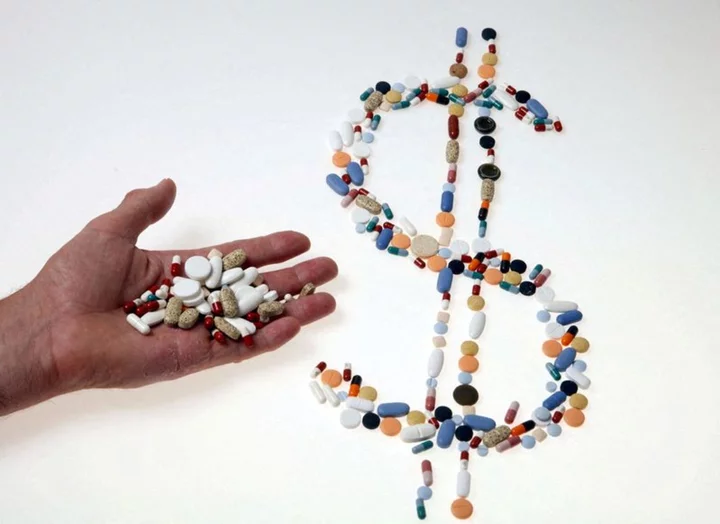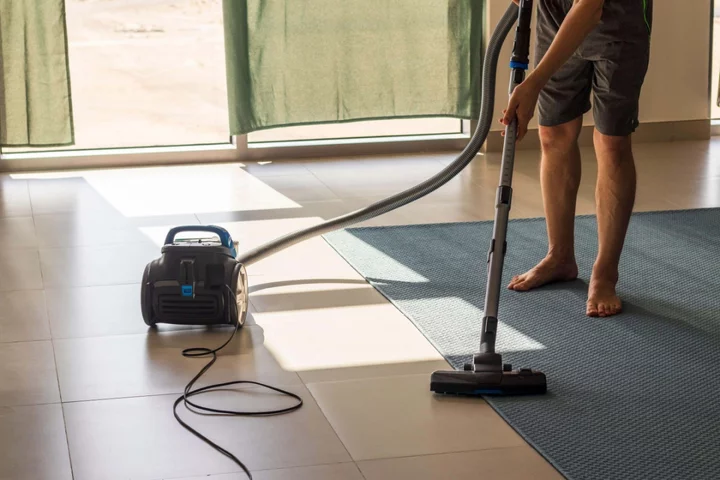
Drugmakers go under the skin, skirting early US Medicare price negotiations
By Michael Erman NEW YORK Injectable versions of some widely-used cancer drugs including Johnson & Johnson's blockbuster multiple
1970-01-01 08:00

Experts reveal the most unhygienic things in your kitchen – and how to get them clean
It’s likely there are countless things in your kitchen which look clean, but actually, they’re filthy. Could your dishcloths be making you sick? When was the last time you washed your tea towels? And do we really need to bleach the sink more than once a month? We asked an expert to find out. Knobs, door handles, and buttons The buttons and dials on your kitchen appliances could be a germ-fest. “People often neglect to clean these areas of the kitchen,” says Danielle Mason, a cleaning content creator – or ‘cleanfluencer’ – who creates tutorials and videos on TikTok and Instagram. “Most of the time, they don’t think it is important, but as you’re commonly handling raw meat and food, it’s extremely important to keep these areas clean, due to cross-contamination. “Always sanitise with a cloth – I like to do this with Zoflora, as it leaves a great smell afterwards, and kills bacteria from dirty fingers.” Cloths If what you clean with isn’t clean, chances are, your kitchen isn’t either. “I always leave my cloth to soak in bleach before going to bed every night,” says Mason. “This enables a new start in the morning with no bacteria. Also, make sure you’re replacing the cloths – I would suggest a new one every two weeks, whilst still bleaching every night. And make sure you’re not using this cloth on anything other than the kitchen, as you do not want to cross-contaminate.” Sponges Mason stresses sponges are unhygienic, as they’re constantly damp and can carry E. coli. “People tend not to use sponges, as they carry so many more germs, and even putting them in the microwave will not kill all of them. Avoid a sponge where possible.” Dish towels Dish towels and tea towels may not be changed anywhere near often enough. “You should have one for every day of the week, as they carry so many bacteria and germs, which get spread across the kitchen. If you’re drying pots and pans, and then wiping down your surfaces, it’s not good,” she says. Chopping boards Chopping boards – particularly wooden ones – could be a haven for bacteria. “You should have a different colour for different types of food, one for meat, fruit, and other foods,” advises Mason. “The best way to clean them is in a dishwasher, as it’s good to get rid of all the germs due to the very high heat. If you don’t like the dishwasher, then boil the kettle water and leave the chopping boards to soak in it. I use a steam cleaner on mine, as it kills 99.9% bacteria and there are no chemicals.” It is best to avoid wooden chopping boards altogether, as these cleaning methods may damage them. Kitchen sink “This is a massive breeder of bacteria and grime; a distinct microbiome is found in sinks. “The plumbing area found beneath sinks revealed microbial communities dominated by a group of bacteria called Proteobacteria. This phylum includes pathogens such as Salmonella and E. coli, which can cause serious disease,” Mason shares. “I’ve always been taught never to wash my hands in the sink, and to never throw dirty water down the sink. You wash your cups and plates in the sink and prepare food, so it should always be kept clean, and nothing from outside the kitchen should cross-contaminate that. For example, never wash your floors and put dirty water in your kitchen sink, always throw it down the toilet.” How do you possibly clean the inside of your sink and drains? “Baking soda and vinegar is the best way to clean your sink out, or bleach, but you must be careful with bleach, as it can stay in the bottom of your sink, depending on the material it’s made of. I clean my sink out every day.” Pipes and cupboards around your sink could be leading you to have a rodent problem. “You can prevent mice and rodents from entering the kitchen by covering any small crevices or cracks. It is also important to repair leaks as soon as they happen, as they can come through the pipes,” she says. Fridges “Deep clean [your fridge] every two months. A normal cleaning – the wiping of shelves – should be done every other day with soapy water. For any bad smells, use baking soda, which will absorb the smell from the fridge,” Mason continues. “The fridge is a breeding ground for salmonella, E. Coli and other bacteria.” Bins Where you throw your waste away could be a breeding ground for germs. “Make sure you keep [outdoor] rubbish bins away from your house, and make sure you empty your bin as soon as it’s full,” advises Mason. “I personally do not keep a bin in the kitchen, I use a bag and I take that out by the end of the day, but if you are using a bin, make sure you bleach it with hot kettle water, to keep it smelling fresh.” Read More This is why you keep waking up at 4am – and what you can do about it TV chef James Martin reveals cancer diagnosis in apology over ‘bullying’ allegations Bursts of activity that make you huff and puff ‘linked to reduced cancer risk’ Charity boss speaks out over ‘traumatic’ encounter with royal aide Ukraine war’s heaviest fight rages in east - follow live
1970-01-01 08:00

Ajax director confirms interest in Mohammed Kudus & Edson Alvarez
Ajax director Sven Mislintat offers an update on the futures of Mohammed Kudus & Edson Alvarez.
1970-01-01 08:00

AIB makes a pre-tax profit of €987m
Its UK division, which includes its NI business, had a pre-tax profit of £119m, up £53m since 2022.
1970-01-01 08:00

Bhima Koregaon: Vernon Gonsalves, Arun Ferreira granted bail by Supreme Court
The two activists have been in jail since 2018 for allegedly inciting caste violence, a charge they deny.
1970-01-01 08:00

Dublin police to receive €10m to target street crime
It comes as an American tourist remains in a serious condition after he was assaulted last week.
1970-01-01 08:00

David Beckham urges Glazers to finally agree Man Utd sale
David Beckham urges the Glazers to sell Man Utd & leaves the door open to returning to Old Trafford in future.
1970-01-01 08:00

'I had the most insane eyebrows': Benny Safdie adopted unkempt apperance for Oppenheimer
Benny Safdie grew bushy eyebrows for his role as Hungarian-American physicist Edward Teller in 'Oppenheimer'.
1970-01-01 08:00

Northeast and Midwest set to bake under intense heat this weekend
Scorching temperatures will continue to smother millions from the Midwest to the Northeast on Friday and into the weekend, triggering emergency mode for cities and testing nation's largest power grid.
1970-01-01 08:00

Israel-Lebanon border tension raises fears of bloody escalation
The Israeli-Lebanon front line holds ever-present risks of a new and devastating conflict.
1970-01-01 08:00

Bursts of activity that make you huff and puff ‘linked to reduced cancer risk’
Short bursts of daily activity that make you huff and puff – such as playing high-energy games with children – could help reduce the risk of cancer, research suggests. According to the study, a total of just four-and-a-half minutes of vigorous activity – done in bursts of around one minute each – during daily tasks could reduce the overall risk of cancer by 18 per cent, and the risk of some cancers linked to physical activity by up to 32 per cent. Other activities could include vigorous housework, carrying heavy shopping around the supermarket, or bursts of power walking. Lead author Professor Emmanuel Stamatakis, of the Charles Perkins Centre, University of Sydney, Australia, said: “We know the majority of middle-aged people don’t regularly exercise, which puts them at increased cancer risk, but it’s only through the advent of wearable technology like activity trackers that we are able to look at the impact of short bursts of incidental physical activity done as part of daily living. “It’s quite remarkable to see that upping the intensity of daily tasks for as little as four to five minutes a day, done in short bursts of around one minute each, is linked to an overall reduction in cancer risk by up to 18 per cent, and up to 32 per cent for cancer types linked to physical activity.” Cancer types linked to physical activity are those where not exercising increases the risk of developing the disease. The cancers associated with physical activity included liver, lung, kidney, gastric cardia (a type of stomach cancer), endometrial, myeloid leukaemia, myeloma, colorectal, head and neck, bladder, breast and esophageal adenocarcinoma (cancer of the oesophagus). Published in Jama Oncology, the study used data from wearable devices to track the daily activity of more than 22,000 people who do not exercise. Researchers then followed the group’s clinical health records for close to seven years to monitor for cancer. They found that as few as four to five minutes of vigorous intermittent lifestyle physical activity (Vilpa) was associated with a substantially lower cancer risk compared with those who undertook no Vilpa. Vilpa was coined by researchers at the University of Sydney’s Charles Perkins Centre to describe the very short bursts of activity – around one minute each – we do with gusto each day. Vilpa is a bit like applying the principles of high-intensity interval training (HIIT) to your everyday life Professor Emmanuel Stamatakis, University of Sydney Prof Stamatakis said: “Vilpa is a bit like applying the principles of high-intensity interval training (HIIT) to your everyday life.” He added that adults who do not exercise are at increased risk of developing certain cancers such as breast, endometrial or colon. But, until recently, experts were not able to measure the impact of less structured forms of vigorous physical activity. In the study sample of 22,398 people with an average age of 62 who did not exercise in their leisure time, the researchers found 2,356 new cases of cancer (1,084 in physical activity-related cancer) over an average follow-up of 6.7 years. They found that a minimum of around 3.5 minutes of daily Vilpa was associated with up to an 18% reduction in cancer incidence, compared with no Vilpa, while 4.5 minutes of daily Vilpa was associated with up to a 32% reduction in the risk of cancers linked to physical activity. The researchers used data from the UK Biobank Accelerometry Sub Study and only included people who reported no leisure time exercise and no regular recreational walks. Read More TV chef James Martin reveals cancer diagnosis in apology over ‘bullying’ allegations Men have a problem – and it won’t be solved by either Andrew Tate or Caitlin Moran Husband fired from family business after wife roleplayed with reborn dolls
1970-01-01 08:00

Global Bonds Fall as Japan Tweaks Yield Control: Markets Wrap
Bonds around the world retreated after the Bank of Japan, so far a holdout on ultra-loose monetary policy,
1970-01-01 08:00
